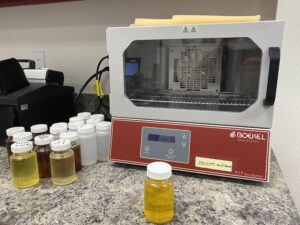Water Quality Testing Requests

Upper Trinity GCD will test registered District wells for presences of coliform and E. coli. UTGCD does not produce letters stating water samples are safe for human consumption.
District testing only identifies the presence of coliform and E.coli, and as such, interested parties are strongly recommended to contact a board certified laboratory for a full water panel analysis of any property if the water quality is linked to sale. Resources to these institutions may be found below.
Realtors & title company officers wanting to request a water test, please fill out the form below. One of our staff will contact you regarding availability after submission. Water tests also require 24 hours so participants are encouraged to await their results via email.
Realtor FAQ’s & Resources
¹Texas Homeowners Beware: 5 Things To Know About Groundwater Conservation Districts
List of Water Laboratories, Texas
What are the requirements for water well disclosure as real property? House Bill 1221, affecting all transfers taking place January 1, 2016 or later, requires sellers of residential real estate to disclose whether any part of a property is in a groundwater conservation district (GCD) or subsidence district. It officially incorporates groundwater as an important component of real property, but the law expressly states that it does not apply “unless the seller has actual knowledge on the date of the notice that the real property is located” in a GCD, and does not “create any duty for any person to investigate to determine if the residential real property is located” in a GCD. So if you simply don’t know, you’re not required to find out.¹
If property you own is in a GCD, you have an opportunity –and some would say responsibility– to be informed and involved in its rulemaking and operations. Groundwater districts exist for the protection of shared groundwater, to ensure long-term supply. Local citizens in Texas are involved and put in countless hours to deal with groundwater issues for their districts; local input is extremely valuable to GCDs.
Where does your client get information on the age of the private well, the type of well, its depth, and testing and and maintenance records? The current homeowner may have testing and maintenance records, and well construction information (also known as a well log, a water well record, or a drilling report). Most states require that a registered well driller file a well log with the state agency or local groundwater conservation district. However, depending on the age of the well, this may not have been done or may be difficult to track down (the District has well reports for wells drilled after 2009). In some cases, your client may be able to contact the individual who constructed the well or may be able to find more information by searching the Texas Department of Licensing and Regulation (TDLR) well reports. If this information is unavailable, then your client will have to rely on the information produced by the current homeowner. Determining the well type—whether dug, driven, or drilled— can often be done by a visual inspection of the well or by a qualified home inspector. For more information on well reports, contact the District.
How does your client determine if the private well will produce enough water for household needs? The well log or drilling report may contain the information on the well’s capacity and yield in gallons per minute. If this information is not available, you can contact a registered well driller to conduct a well yield test. This person will have the equipment and knowledge necessary to conduct the test.
Where should the water be tested? Your client should arrange to have the water tested at a state certified lab. These labs follow accepted procedures for testing contaminants. Make sure that the lab is certified to test for the contaminants requested.The lab will provide sampling instructions and collection bottles for taking the water sample, or in some cases,may send a professional to the home to collect the samples. Contact the District for a listing of certified labs.
What are the costs for testing? What to test for and how much the test will cost will vary by state and lab. Testing can range from as little as $5 for an individual test parameter (like pH) to $250 or more for a combination of tests covering a wide spectrum of parameters. The District provides free testing for the presence of coliform bacteria and eColi; however, it is not a certified lab. Individuals should pick up a sample container from the District office and return it to us for testing between the hours of 8am-5pm M-T. No samples will be taken on Friday, because results must be read within 24 hours of the date and time of collection. Sampling methods can be found on the District website or by calling the District office.